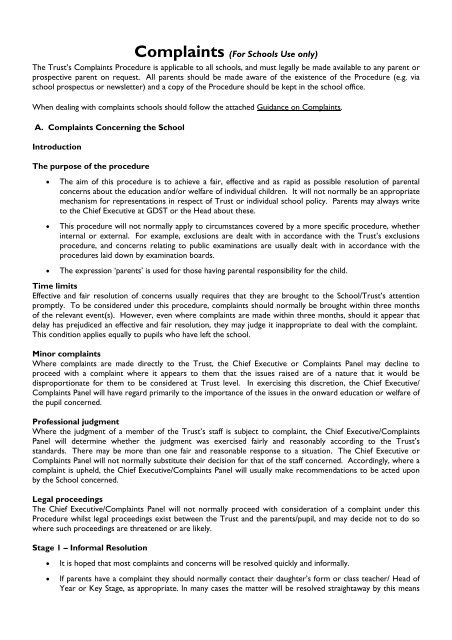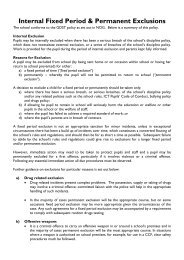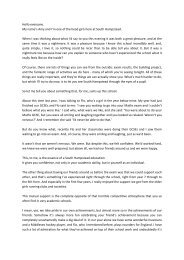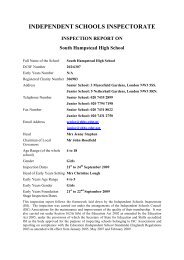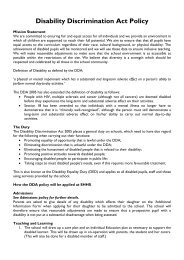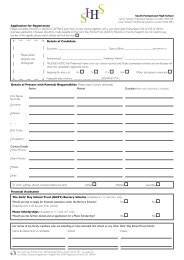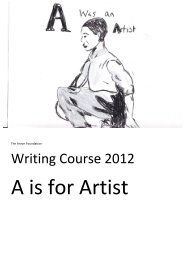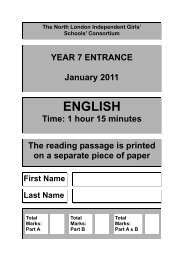Complaints (For Schools Use only)
Complaints (For Schools Use only)
Complaints (For Schools Use only)
Create successful ePaper yourself
Turn your PDF publications into a flip-book with our unique Google optimized e-Paper software.
<strong>Complaints</strong> (<strong>For</strong> <strong>Schools</strong> <strong>Use</strong> <strong>only</strong>)The Trust’s <strong>Complaints</strong> Procedure is applicable to all schools, and must legally be made available to any parent orprospective parent on request. All parents should be made aware of the existence of the Procedure (e.g. viaschool prospectus or newsletter) and a copy of the Procedure should be kept in the school office.When dealing with complaints schools should follow the attached Guidance on <strong>Complaints</strong>.A. <strong>Complaints</strong> Concerning the SchoolIntroductionThe purpose of the procedure• The aim of this procedure is to achieve a fair, effective and as rapid as possible resolution of parentalconcerns about the education and/or welfare of individual children. It will not normally be an appropriatemechanism for representations in respect of Trust or individual school policy. Parents may always writeto the Chief Executive at GDST or the Head about these.• This procedure will not normally apply to circumstances covered by a more specific procedure, whetherinternal or external. <strong>For</strong> example, exclusions are dealt with in accordance with the Trust’s exclusionsprocedure, and concerns relating to public examinations are usually dealt with in accordance with theprocedures laid down by examination boards.• The expression ‘parents’ is used for those having parental responsibility for the child.Time limitsEffective and fair resolution of concerns usually requires that they are brought to the School/Trust’s attentionpromptly. To be considered under this procedure, complaints should normally be brought within three monthsof the relevant event(s). However, even where complaints are made within three months, should it appear thatdelay has prejudiced an effective and fair resolution, they may judge it inappropriate to deal with the complaint.This condition applies equally to pupils who have left the school.Minor complaintsWhere complaints are made directly to the Trust, the Chief Executive or <strong>Complaints</strong> Panel may decline toproceed with a complaint where it appears to them that the issues raised are of a nature that it would bedisproportionate for them to be considered at Trust level. In exercising this discretion, the Chief Executive/<strong>Complaints</strong> Panel will have regard primarily to the importance of the issues in the onward education or welfare ofthe pupil concerned.Professional judgmentWhere the judgment of a member of the Trust’s staff is subject to complaint, the Chief Executive/<strong>Complaints</strong>Panel will determine whether the judgment was exercised fairly and reasonably according to the Trust’sstandards. There may be more than one fair and reasonable response to a situation. The Chief Executive or<strong>Complaints</strong> Panel will not normally substitute their decision for that of the staff concerned. Accordingly, where acomplaint is upheld, the Chief Executive/<strong>Complaints</strong> Panel will usually make recommendations to be acted uponby the School concerned.Legal proceedingsThe Chief Executive/<strong>Complaints</strong> Panel will not normally proceed with consideration of a complaint under thisProcedure whilst legal proceedings exist between the Trust and the parents/pupil, and may decide not to do sowhere such proceedings are threatened or are likely.Stage 1 – Informal Resolution• It is hoped that most complaints and concerns will be resolved quickly and informally.• If parents have a complaint they should normally contact their daughter’s form or class teacher/ Head ofYear or Key Stage, as appropriate. In many cases the matter will be resolved straightaway by this means
to the parents’ satisfaction. If the teacher cannot resolve the matter alone, it may be necessary forhim/her to consult with other staff within the school.• The teacher will make a written record of all complaints and the date on which they were received.Should the matter not be resolved within 10 school days or in the event that the member of staff and theparent fail to reach a satisfactory resolution then parents will be advised to proceed with their complaintin accordance with Stage 2 of this procedure.Stage 2 – <strong>For</strong>mal ResolutionPART ASchool Level• If the complaint cannot be resolved on an informal basis, then the parents should put their complaint inwriting to the Head (or Head of the Junior Department, as appropriate) as soon as possible. The Head(or his or her representative if the Head is not in School*) will investigate the complaint. The Head willrespond to the parents usually within 10 school days.[The Head should respond within the stated timeframe unless there are exceptional circumstances. If aresponse is not given within 10 days, parents should be informed and appraised of the date on which theschool will respond.][*The Head should investigate the complaint unless the Head is out of School for a lengthy period. In suchcases, it would be appropriate to delegate the investigation to the Deputy Head or other senior member ofstaff.][In the case of Junior pupils, the Head of the Junior Department should keep the Head fully informed.]• The Head will keep written records of all meetings and interviews held in relation to the complaint.• Once the Head is satisfied that, so far as is practicable, all of the relevant facts have been established, adecision will be made and parents informed of this decision in writing. The Head will also give reasons forhis/her decision.[It is important that the Head, or the Head of the Junior School, satisfies herself/ himself regarding the quality of theinformation available and any gaps in the School’s performance.]PART BTrust Level• If parents are not satisfied with the Head’s response, or if the complaint is about the Head, the parentsshould write within 10 working days of the Head’s response to the Chief Executive of the Trust at 100Rochester Row, London SW1P 1JP. The complaint should clearly identify the main issue(s) of concern.• The Chief Executive will investigate the matter and aim to respond to the parents within 15 school daysof receiving the complaint. Written records will be kept of all complaints received and of the steps takento investigate the complaint. In particularly complex cases, the Chief Executive will advise parents of anyextra time needed to properly investigate.[Following an investigation, any concerns or recommendations for action may be followed up with the Head inwriting.]• If a complaint is made to the Chief Executive before a formal complaint has been made to the Head, theChief Executive may refer the matter to the Head for resolution.[N.B:• In order to preserve the Chief Executive’s independence, schools should wherever possibleapproach the Legal or Education Adviser for advice on handling a potential complaint at anearlier stage rather than the Chief Executive.• If the Chief Executive is <strong>only</strong> copied in on a letter, the Chief Executive will not respond.<strong>Schools</strong> should provide the Chief Executive with a copy of any response.• It is important that when a complaint is made to Trust Office, schools send all relevantdocumentation to the Chief Executive as soon as possible so that a response can be sent tothe parents within the time limits set by the procedure. Documentation should be clearly
indexed. Relevant documentation is likely to include any written complaints made by theparents to the school, notes of any meetings with the parents or the pupil, notes of meetingswith other pupils involved (e.g. an alleged bully), notes of any relevant absences, and recordsof any concerns raised by staff with parents/pupil and actions taken. N.B. the Chief Executiveor his or her representative may need to make her own enquiries of relevant members ofstaff once she has reviewed the material provided.]• If parents are still not satisfied with the decision, parents are able to proceed to Stage 3 of this Procedurefor those matters which are within the responsibilities of the school or of the Trust. Where thecomplaint is against the decision of an external agency or third party, such as an examination board orhigher education institution, parents will be advised on the appropriate route for their complaint and,where possible, given information and advice about progressing their concerns.Stage 3 – Panel Hearing• If parents wish to have their complaint considered at a Panel Hearing, they should write to the Chairmanof the Council of the Trust at the address above, setting out their complaint.• If a request for a <strong>Complaints</strong> Panel is made without the matter having previously been investigated by theChief Executive, then the Chairman will refer the matter for investigation under Stage 2 of thisprocedure.• In the interests of resolving the complaint expeditiously, complaints should focus on the main issues. It ishelpful if the complainant is able to indicate the nature of the outcome which they are seeking as a meansof resolving their complaint.• The Chairman will then convene a <strong>Complaints</strong> Panel. The Panel will consist of at least three persons notdirectly involved in the matters detailed in the complaint, one of whom shall be independent of themanagement and running of the Trust. Each of the Panel members shall be appointed by the Chairman ofthe Council, and shall normally include two members of Council who are not directly involved with therelevant school.• The Clerk of the Panel will deal with administrative issues prior to the hearing. The Clerk will normallybe the Legal Adviser to the Trust but will not provide legal advice to the Panel on any substantivematters. The Clerk’s role at the hearing will be limited to advice on procedure.• A hearing will be scheduled to take place as soon as practical and normally within 25 school days ofreceipt of the parents’ letter. If, despite the best efforts of Trust personnel, a hearing cannot be arrangedwithin this time period the Clerk of the Panel will write to the parents before the expiry of the 25 dayperiod setting out the likely timeframe for the hearing. The hearing will normally be held at Trust Office,but in cases where it is not reasonable to ask parents and staff to travel long distances, efforts will bemade to hold the hearing at premises near the school.[Where this is not possible, reasonable travel expenses may be available in appropriate cases (e.g. for theparents of full bursary holders).]• The parents should supply copies of their previous written complaint to the Head and Chief Executiveand any other documentation they may wish to rely on to the Clerk for circulation to the Panel and Headnot more than 7 days after the date of notification of the hearing. Documentation must be relevant tothose matters set out in the complaint.• The parents will be supplied with copies of any statements and supporting/background documentationprovided by the Head to the Panel not less than 10 school days before the hearing.• The Panel may refuse to consider matters of which written notice has not been given if doing so appearsto them likely to be prejudicial to a fair and effective consideration of the complaint.• If the Panel deems it necessary, it may require that further particulars of the complaint or any relatedmatter be supplied in advance of the hearing. Copies of such particulars shall be supplied to theChairman’s PA not less than 5 school days prior to the hearing, for circulation to all parties.• The parents may be accompanied to the hearing by one other person. This may be a relative, teacher orfriend. Legal representation will not normally be appropriate.
• The Head will be accompanied by the Chairman (or another appropriate member) of the Local GoverningBody.• Conduct of the hearing shall be at the Panel’s discretion which will be exercised in the interests of a fair,effective, and appropriately rapid resolution of the complaint. The Chairman of the Panel, or their Clerk,will normally write to the parents before the hearing, having considered the nature of the complaint andthe documentary material, to state how the hearing will be conducted. Prior to the hearing, decisionsrelating to procedure may be dealt with by the Chairman of the Panel acting alone. Should the parentshave any questions concerning the Panel’s procedure, they should address them to the Chairman of thePanel at Trust Office.• After due consideration of all relevant facts, the Panel will reach a decision and may makerecommendations. The Panel will write to the parents normally within 5 working days informing them ofits decision and the reasons for it. The Panel’s findings, and (if any) recommendations will also be sent inwriting to the Head, the Chief Executive, the Chairman of Council and, where relevant, the person(s)against whom the complaint was made.[The Head will then follow up any recommendations directly.]Parents can be assured that all concerns and complaints will be treated seriously and confidentially.Correspondence, statements and records relating to individual complaints will be kept confidential except wheredisclosure is required in the course of the school’s inspection or where any other legal obligation prevails.B. <strong>Complaints</strong> Concerning Trust Office• In the event of a complaint which the parents have been unable to resolve satisfactorilywith the person concerned, or her or his line manager, the parents should put thecomplaint in writing to the Chief Executive as soon as possible. The Chief Executive willinvestigate the matter and respond within 10 working days.• If the parents are not satisfied with the response or if the complaint is about the ChiefExecutive, the parent should write to the Chairman of the Council of the Trust at 100Rochester Row, London, SW1P 1JP within 10 working days of the Chief Executive’sresponse. The Chairman will obtain a report from the Chief Executive and determine whatfuture action (if any) should be taken regarding the complaint.GUIDANCE ON COMPLAINTSAll complaints should be taken seriously and investigated appropriately, even if they seem trivial or aparent <strong>only</strong> makes reference to the issue in passing. Serious complaints can originated from passing comments orfrom relatively minor incidents which were not followed up.1. The recording of complaintsAll complaints, however minor, should be recorded in writing. Staff should record as much detailas possible (although this can be done succinctly), including the date/time the complaint was made, if madeverbally (for example, over the phone, in the car park, playground, or classroom).If the complaint was made in a meeting, a note of the meeting should be made and, in addition, a lettershould be sent confirming what was said and what was agreed at the meeting.Copies of all written complaints and records of verbal complaints should be kept on the pupil’s file.At the time the complaint is made, parents should be assured that their complaint will be fullyinvestigated and that the School will inform them of the outcome. This should be confirmed in writing.2. Investigating the complaint<strong>Complaints</strong> concerning other pupils
To investigate a complaint concerning another pupil, it will be necessary to interview the pupils involved.Depending on the allegations that have been made, it may be appropriate to interview the pupil withhis/her parents.If the parent’s allegation concerns bullying please see the SHHS Bullying Policy &Procedures for further details on how to deal with the complaint.If the facts are likely to be disputed by the parties involved, for example if one pupil is alleging another hasstolen something, those involved should be interviewed separately. If there is more than one pupilinvolved they should not be given the opportunity to confer (for example, all those being interviewedwaiting in the same area) and, preferably, should not be told beforehand what the interview is about.Pupils should not be promised absolute confidentiality, as it may be necessary to discuss the substance ofwhat they have said with the pupil/parents making the complaint or the parents of the pupil/pupilcomplained of. This is particularly relevant in bullying cases as the pupils’ statements may be needed tosupport the Head’s decision to exclude the bully.An objective detailed written note must be kept of these interviews. These notes must bemade contemporaneously and must be dated. If more than one staff member is dealing with theissue, all staff should be aware of the outcome of the interviews.<strong>Complaints</strong> concerning staff<strong>Complaints</strong> about staff could range from concerns about their teaching style and ability to concerns abouttheir relationships with pupils, for example complaints of bullying/ inappropriate language used by staff.If the complaint is made to the staff member themselves, the staff member should inform their Head ofDepartment, the Head of the Junior School, or Head depending on the type of complaint. The staffmember should be advised how to respond by a senior member of staff.If the complaint about a staff member is made to the Head or other senior member of staff, that staffmember has the right to know the substance of the allegations against them. It may not always beappropriate to give staff members a copy of the complaint.Obviously, if it appears that an inappropriate incident might have occurred then the staff member involvedshould be taken through the Disciplinary Procedure (which would occur after the initial fact findinginvestigation). Please see the Staff Section on Notes of Guidance for further details of that Procedure orspeak to the Personnel Department at GDST.3. Responding to a ComplaintThe staff member to whom the complaint was made or, if appropriate (depending on the type ofcomplaint), the Head or member of the senior management team, should meet the parent(s) to discussthe outcome of their investigation. This should be done in person, unless due to time pressures it hasbeen agreed that the school will call the parent(s), or unless the complaint is minor and can easily be dealtwith by a letter.Two members of staff should always attend such meetings. A comprehensive andcontemporaneous note should be taken of the discussions and be signed and dated by staff. The <strong>Schools</strong>hould then write to the parents confirming the outcome of the discussions at the meeting and any actionthat will be taken.In the case of a formal complaint under Part A of the <strong>Complaints</strong> Procedure, the investigation andresponse (which must be in writing) should be completed in the stated timeframe. It is important that anyresponse deals with all the issues raised.4. Keeping notesAs set out above, notes should be kept of the complaint and any meetings with parents. In addition,notes should be kept of any telephone conversation etc concerning the complaint. <strong>For</strong> example, a parentcalls to give you further information or to check on progress or they make further comments in passing
in the corridor/class room. It is often these informal discussions that lead to misunderstandings ordiffering recollections.It is also important to remember that any notes taken could be disclosed, either in a court case or ifparents request a copy of the file and the records should therefore be objective. Personal opinions orcomments about parents or their behaviour should not be recorded. However, it should be notedfactually if the conversation becomes heated or the parent(s) become upset or distressed.5. Keeping parents informedIt is important to keep the parent informed of the School’s progress. If the School has agreed to reportback by a particular date, the School should respond by that date or let the parent(s) know that there hasbeen a delay and by when the response will be provided.If the School has promised to undertake a particular course of action (for example, provide extra lessonsfor three weeks), the school should report to the parents, in writing, that this has been done.6. Communications between staffIn some situations (for example bullying) it will be important to let other staff know (for example, thosestaff that teach the pupil involved, or otherwise have significant contact with the pupil) that that pupil ishaving difficulties. Staff can then monitor the situation and report anything of concern.However, what details are disclosed to whom will have to be decided on a case by case basis. Somecomplaints may involve confidential information, or the pupil may be particularly sensitive about thesituation, and the school may therefore decide that staff should <strong>only</strong> be informed on a need to knowbasis.It is important that parental concerns/complaints are passed on in key points of transfer, for examplefrom the Junior to the Senior phase.7. <strong>Complaints</strong> to be investigated by Trust OfficeIf the Chief Executive receives a formal complaint pursuant to Part B of Stage Two of the <strong>Complaints</strong>Procedure, Trust Office staff will investigate the complaint, to enable the Chief Executive to respondappropriately.<strong>Schools</strong> will be asked for a copy of all relevant information (which should include any written complaintsfrom parents, notes of any meetings with parents, records of concerns raised by staff, notes of anyrelevant absences and notes of meetings with other pupils involved), as this will provide the informationon which the Chief Executive will base his/her response. Given that the Chief Executive is requiredto respond to complaints within 15 school days, it is essential that schools send theinformation immediately on receiving a request from Trust Office. A senior member of staffshould review the material before it is sent and follow up any gaps which may be evident.In some circumstances, it may be necessary for Trust Office staff to visit the school to discuss thecomplaint with the staff involved, to get a fuller picture of what has occurred and the action taken by theSchool.8. Disclosure of documentsParents often request a copy of the complaint made against their child by other parents. Thesecommunications are confidential and should not be disclosed. However, the parents should be told of thesubstance of the complaint made against their child.When parents make a complaint they also often also request a copy of their child’s school file. Inaccordance with the Data Protection Act 1998 such requests must be in writing to the Head. Where thechild is over 12 years of age the Information Commissioner’s guidance provides that the child shouldmake the request themselves. <strong>Schools</strong> then have 40 days in which to respond to such a request afterreceiving the relevant fee (which is £10).
Although the majority of the child’s school file will be disclosable, care should be taken to removereferences to third parties. Further guidance on disclosure is available in the Data Protection Section onNotes of Guidance.9. Possible action outside the complaints procedureIf a parent is unhappy with the outcome of a complaint, they may bring an action in negligence seekingcompensation from the school for the damage which they allege has been suffered by the child. Theseclaims will be covered by the Trust’s insurance. Any such claims should be referred to the LegalDepartment immediately.


